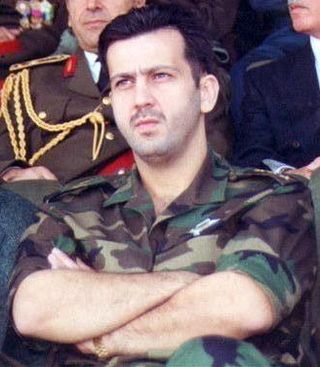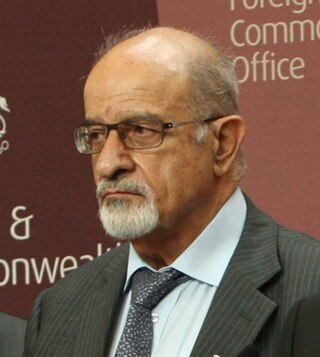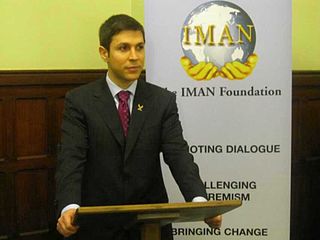Related Research Articles

Bashar al-Assad is a Syrian politician who is the current and 19th president of Syria since 17 July 2000. In addition, he is the commander-in-chief of the Syrian Armed Forces and the secretary-general of the Central Command of the Arab Socialist Ba'ath Party, which nominally espouses a neo-Ba'athist ideology. His father and predecessor was General Hafiz al-Assad, whose presidency in 1971–2000 marked the transfiguration of Syria from a republican state into a de facto dynastic dictatorship, tightly controlled by an Alawite-dominated elite composed of the armed forces and the Mukhabarat, who are loyal to the al-Assad family.

Maher al-Assad is a Syrian general and commander of the Syrian Army's elite 4th Armoured Division, which together with Syria's Military Intelligence form the core of the country's security forces. He is also a member of the Central Committee of the Ba'ath Party's Syrian Regional Branch.

Jordan–Syria relations are bilateral relations between the sovereign states of Jordan and Syria. Relations between neighbours have ancient roots as both countries are historically parts of the Levant or Greater Syria. The two states were created after the First World War from former Ottoman dominions by way of a secret bilateral agreement between Britain and France.
In United States law, providing material support for terrorism is a crime prohibited by the USA PATRIOT Act and codified in title 18 of the United States Code, sections 2339A and 2339B. It applies primarily to groups designated as terrorists by the State Department. The four types of support described are "training," "expert advice or assistance," "service," and "personnel."

Syria–United Arab Emirates relations refer to the relationship between the United Arab Emirates (UAE) and the Syrian Arab Republic. The UAE has an embassy in Damascus and Syria has an embassy in Abu Dhabi and a consulate-general in Dubai. Both countries are members of the Arab League, part of the Middle East region and share close cultural ties.

Haitham al-Maleh is a Syrian human rights activist and former judge. He is a critic of the current Syrian government under Bashar al-Assad and has been imprisoned by the Syrian government because he was calling for constitutional reforms. Maleh became an important opposition figure in the Syrian Civil War.
Shaykh Adnan Mohammed al-Aroor is a Salafi scholar from Hama, Syria.
Riad Mousa al-Asaad is a Syrian military commander, politician who is the founding leader of the Free Syrian Army. One of the prominent faces of the Syrian Civil War, he led the armed resistance to the Assad regime as commander-in-chief of FSA, during the early phase of the Syrian Civil War. Under Riad al-Asaad's command, FSA expanded into a paramilitary force of 75,000 guerillas and insurgents in March 2012; capable of ousting regime forces from Damascus. He currently serves as the Deputy Prime Minister for Military Affairs of the Syrian Salvation Government, a position he has held since 2 November 2017. He was a former Colonel in the Syrian Air Force who defected to the opposition in July 2011 and became the first Acting Commander-in-chief of the Free Syrian Army.
Mohamad Anas Haitham Soueid is a Syrian-born naturalized United States citizen and a resident of Leesburg, Virginia who was indicted on espionage-related charges by federal prosecutors in October 2011. Soueid, 47 years old, is accused of passing information about Syrian American protesters in the United States to the government of Syrian President Bashar al-Assad, who are thought to have arrested and tortured numerous Syrian political refugees' family members and associates living in Syria.

Ribal al-Assad is a Syrian businessman and political activist. He is the Founder and Director of the Organisation for Democracy and Freedom in Syria (ODFS) and the Chairman and Founder of The Iman Foundation.
Issam Jad'aan Zahreddine was a Syrian military officer and former commander of the Syrian Republican Guard. He played a major role in the Syrian Civil War, leading Syrian government forces on several fronts. His most prominent role was the leadership of the surrounded Syrian forces during the over three-year long Siege of Deir ez-Zor. On 18 October 2017, Zahreddine was killed by a land mine explosion during operations against the Islamic State of Iraq and the Levant on Saqr island in Deir ez-Zor.

Presidential elections were held in Syria on 3 June 2014. There is a scholarly consensus that the elections were not democratic. The result was a landslide victory for Bashar al-Assad, who received over 90% of the valid votes. He was sworn in for a third seven-year term on 16 July in the presidential palace in Damascus.
The Islamic State of Iraq and the Levant (ISIL) is proscribed as a terrorist organisation by the United Kingdom. British citizens have fought as members of the group, and there has been political debate on how to punish them. On 26 September 2014, Parliament voted to begin Royal Air Force airstrikes against ISIL in northern Iraq at the request of the Iraqi government, which began four days later, using Tornado GR4 jets. On 2 December 2015, the UK Parliament authorised an extension to the Royal Air Force airstrike campaign, joining the US-led international coalition against ISIL in Syria. Hours after the vote, Royal Air Force Tornado jets began bombing ISIL-controlled oilfields.

The Jordanian military intervention in the Syrian Civil War began on 22 September 2014, with airstrikes on Islamic State of Iraq and the Levant (ISIL) targets, and escalated after the murder of Muath al-Kasasbeh, a Jordanian pilot who was captured by ISIL when his F-16 Fighter Jet crashed over Syria in early 2015. Though Jordan's strikes in Syria largely tapered off after December 2015, airstrikes have continued through February 2017, and Jordan has continued to support rebel groups in Syria and host military activities of other countries.
There has been an increase in incidents involving alleged radical Islamism in the Balkans since the 1990s.
On September 1, 2017, American officials announced they had recently taken custody of an American ISIS fighter who wasn't immediately identified. In December 2017, it was revealed that he was a joint citizen of the United States and Saudi Arabia. He was the first captive the USA called an enemy combatant since 2009.
Jasminka Ramic is a joint citizen of Bosnia and the United States who pled guilty to supporting terrorism in an American court, in 2015. Ramic and five other Bosnian-Americans were charged in February 2015. American intelligence officials described Ramic and Ramiz Zijad Hodzic, Sedina Unkic Hodzic, Medy Salkicevic, Armin Harcevic, and Nihad Rosic as being followers of Abdullah Ramo Pazara, another Bosnian-American, who travelled to Syria and volunteered to fight on behalf of Daesh, otherwise known as ISIS.
Zulfi Hoxha, also known by the nom de guerre (kunya) Abu Hamza al-Amriki, or Al Ameriki, was an Albanian-American Islamic State (IS) senior commander and recruiter of foreign fighters fighting in Syria and in Iraq.
International and national courts outside Syria have begun the prosecution of Syrian civil war criminals. War crimes perpetrated by the Syrian government or rebel groups include extermination, murder, rape or other forms of sexual violence, torture and imprisonment. "[A]ccountability for serious violations of international humanitarian law and human rights is central to achieving and maintaining durable peace in Syria", stated UN Under-Secretary-General Rosemary DiCarlo.

Presidential elections were held in Syria on 26 May 2021, with expatriates able to vote in some embassies abroad on 20 May. The three candidates were incumbent president Bashar al-Assad, Mahmoud Ahmad Marei and Abdullah Sallum Abdullah. The elections were considered not to be free and fair. The United Nations condemned the elections as an illegitimate process with "no mandate"; accusing the Ba'athist regime of undermining UN Resolution 2254 and for obstructing the UN-backed political solution that calls for a "free and fair elections" under international monitoring.
References
- 1 2 Seamus Hughes. "Abdullah Ramo Pazara: Overview". George Washington University Program on Extremism . Retrieved 2017-09-29.
NBC News quoted unnamed "authorities" in stating that Pazara may have been killed in 2014. Pazara's activities are well-documented in the indictment of six other Bosnian-Americans who were charged with providing material support to terrorists and one count of conspiracy to provide material support to terrorists.
- 1 2 3 Seamus Hughes, Bennett Clifford (2017-05-17). "First He Became an American—Then He Joined ISIS". Atlantic magazine . Retrieved 2017-09-29.
To uncover Abdullah Ramo Pazara's story, we spent months tracking down the fragments of Pazara's life from around the world—U.S. federal court documents in the Eastern District of Missouri, reports of military records from a Serbian nationalist paramilitary formation, truckers' licenses from the state of Michigan, media accounts, Facebook posts from a villa in Azaz, Syria.
- 1 2 Robert Patrick (2017-04-09). "funding case hope to prove St. Louis man was 'lawful combatant'". St Louis Post-Dispatch . Retrieved 2017-10-01.
Seamus Hughes, deputy director of George Washington University's Program on Extremism, has researched Pazara's activities and called the defense motion "a very novel but uphill battle."
- 1 2 Robert Patrick (2017-07-26). "St. Louis County residents, others seek to dismiss charges in terror funding case". St Louis Post-Dispatch . Retrieved 2017-10-01.
The defense motion to dismiss two counts of the indictment says that Abdullah Ramo Pazara fought for groups supported by the U.S. government and therefore "qualified for combatant immunity for their acts of legitimate warfare against the Bashar al-Assad regime."
- ↑ "Feds Charge 6 With Terrorism-Related Crimes Involving Links to ISIS". NBC News . 2015-02-07. Retrieved 2017-09-29.
Prosecutors say Pazara communicated through Facebook and other social media with the six people charged.
- ↑ Samantha Masunaga (2015-02-08). "6 Bosnian immigrants indicted in alleged overseas terror financing ring". Los Angeles Times . Retrieved 2017-09-29.
One name that comes up repeatedly in the document, but is not among the indicted, is that of Abdullah Ramo Pazara, a Bosnian native who also went by three other names. Pazara became a naturalized citizen of the U.S. and lived in St. Louis, Mo., for a time before leaving the country in May 2013.